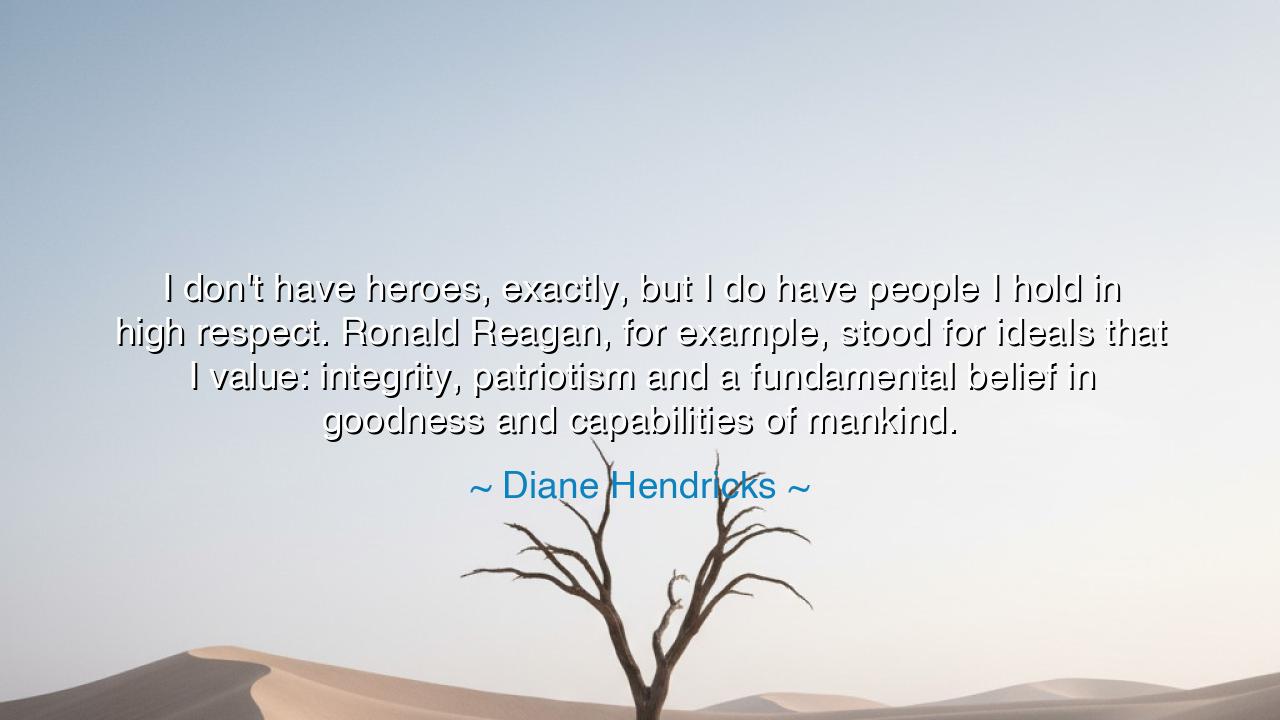
I don't have heroes, exactly, but I do have people I hold in
I don't have heroes, exactly, but I do have people I hold in high respect. Ronald Reagan, for example, stood for ideals that I value: integrity, patriotism and a fundamental belief in goodness and capabilities of mankind.






The words of Diane Hendricks—“I don’t have heroes, exactly, but I do have people I hold in high respect. Ronald Reagan, for example, stood for ideals that I value: integrity, patriotism and a fundamental belief in the goodness and capabilities of mankind.”—echo with the wisdom of someone who understands that reverence for individuals should not be blind worship, but respect for the ideals they embody. Hendricks teaches us here that a true measure of greatness lies not in idolizing a person’s name, but in recognizing the virtues they carried and the inspiration they gave. Heroes pass; ideals endure.
The ancients too drew this distinction. In the days of Greece, men honored Achilles, Odysseus, and Hercules not simply for their feats, but for the virtues they symbolized—strength, cunning, endurance. Yet the wise did not merely worship these figures; they studied them as mirrors of values to be cultivated in their own lives. Similarly, Hendricks’ reflection calls us to hold in reverence those who shine as examples, not to elevate them as gods, but to learn from the integrity and patriotism they practiced.
In naming Ronald Reagan, Hendricks points to a leader who, whatever one thinks of his politics, spoke with conviction about faith in humanity’s potential. His words often carried a belief in the goodness of ordinary people and in their ability to overcome adversity when given freedom and trust. For Hendricks, it is not the man himself as an idol that matters, but the values he stood for—confidence in human capabilities, belief in the nobility of patriotism, and the grounding force of integrity in public life.
History gives us many such examples of figures who inspired not through perfection but through their alignment with lasting virtues. Consider George Washington, who resisted the temptation to crown himself king and chose instead to step down after two terms, setting an example of humility and democratic leadership. His greatness did not come from being idolized as a flawless hero, but from embodying integrity and restraint, virtues that shaped the destiny of a nation. Like Reagan for Hendricks, Washington stands as a figure to be respected not for godlike perfection, but for embodying ideals worth imitating.
The meaning of Hendricks’ words is thus clear: true heroes are not those who demand worship, but those who reflect back to us the values that strengthen humanity. To respect a leader for their patriotism is not to excuse their flaws, but to acknowledge that in their best moments, they carried something noble that can guide us. To respect another’s integrity is to remind ourselves to cultivate truthfulness in our own dealings. To revere belief in human goodness is to challenge ourselves never to sink into cynicism, but to see the light even in dark times.
The lesson for us is profound: seek out people who embody the virtues you value, but do not fall into the trap of blind adoration. A person’s life is mixed with triumph and failure; what matters most is the spark of idealism they leave behind. Respect them, learn from them, and then carry those virtues into your own life. Do not wait for great heroes to save you—become a bearer of integrity, a servant of patriotism, a witness to human goodness in your own sphere.
Practical action flows from this teaching. Identify those around you, whether great leaders or humble neighbors, who embody values you admire. Respect them, honor them, and study the ways they live. Then, let their example stir you to action: practice integrity in your work, show patriotism by serving your community and country with honesty, and nurture belief in the capabilities of others by lifting them up when they falter. In this way, the ideals that Hendricks treasures will live not only in the figures of history, but in your own life.
Thus, her words endure as a reminder: do not build idols of stone, but cultivate virtues of the soul. Do not wait for flawless heroes to arrive, but let the examples of the past awaken the greatness within you. For integrity, patriotism, and faith in the goodness of mankind are not just qualities of leaders—they are the inheritance of all who choose to live with courage and vision.






AAdministratorAdministrator
Welcome, honored guests. Please leave a comment, we will respond soon